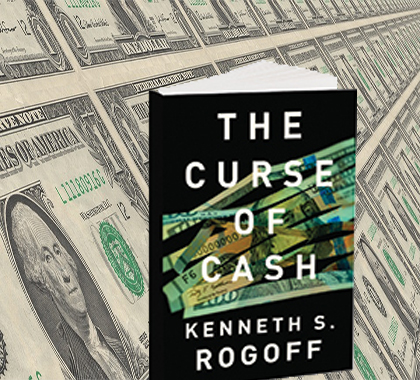Physical currency, in one form or another, has existed for innumerable years, but some people, convinced by their own hubris that they know something the collective minds of humanity have not devised, believe government can replace physical money with something better.
Kenneth Rogoff is one of those people. The best and the brightest, a category in which Rogoff likely self-identifies as an economics professor at Harvard University, continue to busy themselves pushing long-discredited Keynesian ideas, including the central premise that governments and their central banks can create heaven on Earth, if only given a chance.
Describing a Fantasy World
For all its faults, The Curse of Cash is an excellent illustration of the liberal’s quest to “immanentize the eschaton” through bigger government and better technocratic coercion.
Utterly failing to make the case for a cashless futuristic utopia, The Curse of Cash reads more like a tract from Orwell’s Oceania that is intended to convince fellow travelers black is white and ignorance is strength, rather than to persuade outsiders. Instead of addressing the realities of the world as it is, Rogoff describes the world as he thinks it should be. His book reads like a philosophical argument for a centralized Big Brother-type government.
Slaying Strawmen
Rogoff breaks out an army of straw-man arguments against the use of physical currency, leading readers to conclude he imagines himself a slayer of pro-currency arguments, when in fact his anti-currency arguments ring hollow and groundless.
For example, throughout the book, Rogoff appears to assume money is the root of all evil. He argues halting the use of physical currency will relieve the nation of all sorts of ills and evils, ranging from tax evasion and political corruption to drugs and sex trafficking.
“A culture of corruption can be extremely difficult to change, even when a country’s leaders are determined to do so,” Rogoff wrote. “Nevertheless, there is little question that the ability to make anonymous, real-time, untraceable payments in cash facilitates it.”
Less Money, Less Crime?
Criminals can use currency to conceal activity, Rogoff notes, and from there he leaps to the conclusion eliminating that tool will get rid of much of the crime. He does acknowledge the obvious point that criminals could use alternative means of doing transactions if physical money were unavailable.
“Yes, especially as large notes are phased out, those engaged in corruption and other criminal activities will find other ways to do business, and there will be an even greater incentive for innovation,” Rogoff wrote, citing “transaction technologies that circulate completely outside the legal economy.”
“But other ways of making payments (gold, uncut diamonds, bitcoins) each have their problems, ranging from illiquidity and high transaction costs (uncut diamonds) to risks of ultimate tracing (bitcoins),” Rogoff wrote.
In short, Rogoff’s proposed solution to crime is vastly more government than we already have. He suggests relying more heavily on centralized banks and promotes greater government interference in the flow of money. Rogoff also claims paper money reduces lawmakers’ ability to use monetary policy to exert control over markets—a highly implausible claim in our modern world, when a great proportion of transactions are electronic.
Money and Power
Rogoff spends nearly half the book trying to convince the reader cash is getting in the way of the government’s power over the people, but a simple look around should make it apparent to everyone the government has plenty of power—too much power, in fact. Getting rid of cash would only accelerate the nation’s descent into a socialist dystopia.
Rogoff clearly loves government, and the bigger the better.
“Where does one draw the line between the government’s right to enforce tax laws and the public’s right to privacy?” Rogoff wrote. “The answer is simple: The government does not have any rights at all. Only individuals have rights. If individual rights make it more difficult for the government to enforce its edits, the government must give way.
Even before readers have started digging into the main course of his pro-government pabulum, Rogoff prefaces the book with a declaration of intellectual victory, closing the exchange of ideas before readers have even settled into their seats.
“Regardless of readers’ initial prejudices, I suspect many will find the facts presented in this book sobering, and many of the arguments for preserving currency in its current form more superficial and less compelling than they might believe,” Rogoff writes.
Love Letters to Bernanke
The book is not entirely without merit, if a reader approaches it with a healthy sense of humor. One particularly amusing motif recurring throughout the book is Rogoff’s over-the-top praise for former Federal Reserve Chairman Ben Bernanke, whom the Harvard economist praises with epithets such as “academic,” “important,” and “perfectly reasonable.”
Whatever ironic humor I found in this book was fully offset by the author’s tedious and intellectually dishonest argumentation and naked ideology. The Curse of Cash would be more accurately titled “The Curse of Lazy Liberalism.” Potential readers would do well to steer clear of this accursed book, unless they have a powerful desire to slog through a poorly written manifesto that promotes paternalistic policymaking.





